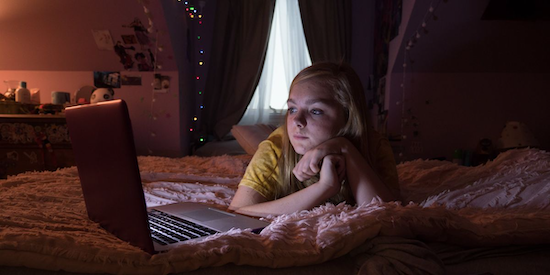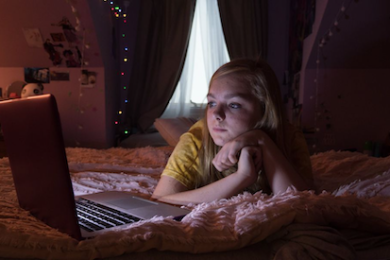Hollywood has often looked to childhood – especially those formative teenage years with their hothouse mix of burgeoning desires and intense social pressure – as a rich seam to be mined, a potential source of renewal. Usually, the writer/director’s own. George Lucas once helped usher in the New Hollywood with a nostalgic glance at his own 50s adolescence in American Graffiti. John Hughes drew on his mid-60s schooling in suburban Northbrook, Illinois, to make his pathbreaking series of 80s high school dramas. Richard Linklater’s Texan youth has persistently been the source material for his greatest creative triumphs (namely Dazed & Confused, Boyhood). More recently, Alfonso Cuarón used his childhood in Mexico City’s early 70s Colonia Roma district to signal an abrupt change of style and newfound classicism. Eighth Grade is different.
Bo Burnham’s feature debut is a film weaned on the internet – and not the post-millennial web of Burnham’s own youth and first flush of success. When Burnham was himself at school, Facebook was still cool and there were probably dinosaurs around and stuff. At least, there might as well have been from the perspective of these kids. For Elsie Fisher’s Kayla Day and the other eighth-graders at Burnham’s fictional Miles Grove Middle School, obviously, “no-one uses Facebook” (a line spoken by Fisher in the film, parroting a corrective the actress issued herself – offscreen – to writer-director Burnham after reading an earlier draft of the screenplay).
Back in the prehistoric mid-00s, Burnham was himself a teenage YouTuber, while still a senior at St John’s Catholic high school in Danvers, Massachusetts. His self-shot musical comedy grew an audience in the millions (and no small share of controversy) which ultimately brought the attentions of Comedy Central and a Hollywood agent. Burnham, then, is a digital native. He grew up online, albeit an earlier kind of online. Little surprise then that one of the successes of Eighth Grade is its feeling for the texture of a life lived through screens. The first image we see in the film is shot through the webcam of a Macbook. Kayla’s regular vlogs punctuate the film like a Greek chorus or a Shakespearian soliloquy.
Kayla Day is very, very online. She spends mealtimes plugged into her phone scrolling Instagram, she watches YouTube make-up tutorials, takes lots of selfies, fills in Buzzfeed quizzes, googles blowjob technique, communicates with her peers almost exclusively via Snapchat. And then there are her vlogs – lifestyle advice delivered direct to camera and always concluded with an ok hand gesture and the sing-song catchphrase (again, apparently Fisher’s own) “gucci!” Almost all of these things – let alone the offline school shooter drill Day and her classmates have to go through at school – would have been quite alien to Burnham’s own childhood. And far from mere window-dressing detail, a major part of the theme of Eighth Grade is the way identity is shaped and constituted in and through media in different ways at different times.
The shift from Burnham’s internet and the internet of his fiction is not just in the grain of the film, it is also its explicit subject, a topic of conversation for his characters. Hanging out at the mall, 17 year-old Trevor (Fred Hechinger) insists that 13 year-old Kayla is of “a different generation” because she had Snapchat in fifth grade and is therefore “wired differently” whereas the older sister of his friend Olivia is “different” again because “she didn’t have Twitter in middle school”. Burnham is alive to the transformations these technologies have brought about in children’s subjectivities because, growing up shy, he socialised himself online. And when he wanted to research the way kids today speak and feel he looked it up – of course – on YouTube.
Born and nurtured online, Eighth Grade gets the online space better than most techno-thrillers. Partly because – rarely in Hollywood films – the movie eschews fake pages mocked up by art departments and clever graphic devices like onscreen text bubbles, scrolling green numbers, or neon gridscapes and simply shows us what the film’s Wikipedia page calls “the real internet”. Alongside, the songs used (Enya’s ‘Orinoco Flow’ and SoundCloud rapper RonSoCold) and TV clips (Cartoon Network and Alan Carr: Chatty Man), the end credits list reams of permissions from Tumblr, Twitter, YouTube, and Buzzfeed. The production crew were also forced to make many ‘fake’ Instagram and Twitter profiles to populate the “real internet”.
That “real internet” is one of the chief conduits via which the film burrows its audience into the inner life of its subject. But it is not the only one.
There is a point towards the end of the film, in the midst of what proves to be Kayla’s final vlog, where she confesses to her followers that she is “really, like, nervous all the time, and, like I could be doing nothing and it’s just, like, nervous, and it’s like I’m waiting in line for, like, a rollercoaster, and that stupid butterflies in your stomach feeling you get, like, I get that all the time, and like, I never get the feeling of after you ride the rollercoaster.” Watching that bit in the film, a voice inside my head said, yes! That’s exactly how I’ve felt all the way through this film!
Eighth Grade is a comedy of awkwardness, a drama of social unease and stomach-knotting cringe. In this sense it resembles – or is at least some kind of z generation heir to – TV shows like The Office and Curb Your Enthusiasm. But unlike those older peers, a great deal of Eighth Grade’s tension is generated by the brilliant score from British composer Anna Meredith. The one-time Camberwell Composers Collective co-founder has produced an electronic soundtrack of dizzying intensity, like EDM with all the macho drops and pumping bass stripped out, still left with all of its thrills, its high-wire fervour, its maximalist delirium. This music plunges the audience immediately and forcefully into Kayla’s emotional world. As the film’s closing credits, zoomed in close on the pixellated red green and blue of Kayla’s computer monitor, ably demonstrates, Meredith’s kaleidoscopic digital psychedelia is the perfect compliment to the deep online textures of the film as a whole. We are in there with her. We feel it. It’s excruciating.
Eighth Grade, directed by Bo Burnham, is in UK cinemas now



